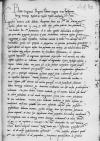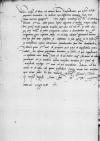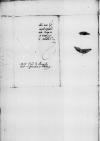Accepimus binas Tuae S(trenuita)tis or S(incerita)tis⌈S(trenuita)tisS(trenuita)tis or S(incerita)tis⌉
litteras, ⌊⌋ 1527-04-22⌊XXII-a Aprilis1527-04-22⌋, ⌊⌋ vero 1527-05-06⌊VI Maii1527-05-06⌋ ex ⌊Valle Oleti⌋. Quibus perlectis non potuimus non laudare Tuae S(trenuita)tis or S(incerita)tis⌈S(trenuita)tisS(trenuita)tis or S(incerita)tis⌉
patientiam et in rebus agendis dexteritatem ac diligentiam, quae cum nobis perspecta fuerint et sunt, studebimus uberiori nostra gratia suggerente se causa rependere.
Dolemus mirum in modum de adversa Tuae S(trenuita)tis or S(incerita)tis⌈S(trenuita)tisS(trenuita)tis or S(incerita)tis⌉ valetudine, quam Deo propitio in prosperam et optatam permutari percupimus. Quod attinet ad negotia nostra: non possumus non mirari, cur nobis et rebus nostris tot technae totque fallaciae parentur, tot simultates obstruantur. Si caesariani aperte loquerentur, vel congruum reportarent responsum, vel nos alia via rebus nostris consultum iri vellemus et ad praesens ab ingerendis ⌊caesari⌋ fastidiis abstineremus. Solutio Adohae iam exacta est et hoc factum necessitate urgente excusatur, alias exigetur voluntate praecipientium, etiamsi iura et consuetudines obstarent, et quae a principio necessitatis exsistunt, ex post facto voluntatis fiunt et in sequelam trahuntur.
Proinde hortamur S(trenuita)tem or S(incerita)tem⌈S(trenuita)temS(trenuita)tem or S(incerita)tem⌉ Tuam, nitatur totis viribus a sacra ⌊caesarea maiestate⌋ obtinere, vel saltem gratiose, ut ab huiusmodi solutione liberae immunesque reddamur, ne deterioris condicionis nos, quam nostri praedecessores, videamur.
De ⌊arce Barensi⌋ sumus contentae, quod ad manus nobilis ⌊Colae Mariae de Summa⌋ extradatur et nostro nomine consignetur, cum hanc viam faciliorem S(trenuitas) or S(inceritas)⌈S(trenuitas)S(trenuitas) or S(inceritas)⌉ Tua arbitretur. Verum quia bellorum turbines in Italia in horas excandescunt, nescimus, quo modo haec ⌊arcis⌋ restitutio ad praesens fieri possit. Praestolabimur bellorum eventum, quibus utinam Deus Optimus Maximus extremum finem imponat, et tunc hoc desiderium nostrum exsecutioni demandari curabimus, et recuperata ⌊arce⌋ in utramque aurem dormire valeamus et Tuam S(trenuita)tem or S(incerita)tem⌈S(trenuita)temS(trenuita)tem or S(incerita)tem⌉ ad nos (ut cupimus) revocare.
De litteris obtinendis, ne contra ⌊statum nostrum Barensem⌋ aliquid innovetur, postquam tanta obicitur difficultas, quiescat S(trenui)tas or S(inceri)tas⌈S(trenui)tasS(trenui)tas or S(inceri)tas⌉ Tua et ab earum postulationibus abstineat.
De sabellis placet, quod S(trenui)tas or S(inceri)tas⌈S(trenui)tasS(trenui)tas or S(inceri)tas⌉ Tua constituit et id exsequatur.
Accepimus provisionem de civibus  BCz, 243, p. 76 Barensibus occisis et illam ad ⌊statum Barensem⌋ transmittemus, quo possit debitae exsecutioni demandari, et credimus eam difficulter obtentam, nam raro corvus corvum oppugnat.
BCz, 243, p. 76 Barensibus occisis et illam ad ⌊statum Barensem⌋ transmittemus, quo possit debitae exsecutioni demandari, et credimus eam difficulter obtentam, nam raro corvus corvum oppugnat.
De negotio ⌊secretarii⌋ nostri etc. id nitatur obtinere S(trenui)tas or S(inceri)tas⌈S(trenui)tasS(trenui)tas or S(inceri)tas⌉ Tua, quod poterit, nostris dignitate et iuribus semper salvis.
Die XXVII-a mensis praeteriti redditae sunt nobis ⌊⌋ Tuae S(trenuita)tis or S(incerita)tis⌈S(trenuita)tisS(trenuita)tis or S(incerita)tis⌉ ex ⌊Valle Oleti⌋ 1527-05-21⌊XXI Maii1527-05-21⌋ datae, ex quibus perspeximus solitam et commendandam Tuae S(trenuita)tis or S(incerita)tis⌈S(trenuita)tisS(trenuita)tis or S(incerita)tis⌉ diligentiam circa negotium adohae, ut illius solutione efficeremur immunes, sed pro praesenti anno persoluta est. Cuperemus, si fieri posset, ut in posterum ex munificentia ⌊caesaris⌋ liberaremur, quandoquidem iura nostra obaudiuntur. Hortamur igitur S(trenuita)tem or S(incerita)tem⌈S(trenuita)temS(trenuita)tem or S(incerita)tem⌉ Tuam, id extorqueat, quod potest, et impossibilia praetermittat.
Nos in horas exspectamus nuntium ex ⌊Italia⌋, a quo cognoscemus, an restitutio ⌊arcis Barensis⌋ facta sit et ad manus magnifici ⌊Colae Maria de Summa⌋ pervenerit, ut ex mandato ⌊caesaris⌋ novissime decretum est. Quod ubi successerit, e vestigio S(trenuita)tem or S(incerita)tem⌈S(trenuita)temS(trenuita)tem or S(incerita)tem⌉ Tuam ad nos rovocabimus. Interim sit boni animi et de nobis sibi optime persuadeat, hancque moram, licet molestam, aequo animo ferat.
Et bene valeat.
 BCz, 243, p. 76 Barensibus occisis et illam ad
BCz, 243, p. 76 Barensibus occisis et illam ad 

